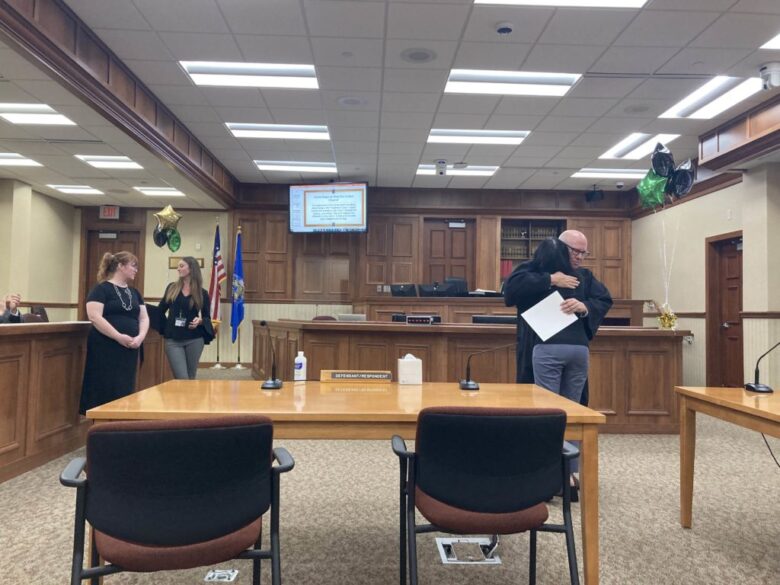Going into what would be its sixth year of operation, Door County’s Drug Treatment Court will not be included in the county’s budget for 2026, according to Health and Human Services Director Joe Krebsbach. HHS runs the program in cooperation with county courts and law enforcement, and has had several staff vacancies for months.
Treatment Court has been limping along since January, according to Krebsbach, and he and other department staff have been covering most of the duties of three open positions in order to get the remaining eight participants through the program. After the participants graduate or leave the program, Treatment Court will cease operations.
Treatment Court is funded by a matching grant from the state and received about $266,000 this year. Taking the program out of the county budget means the county will no longer receive that funding. Krebsbach said opioid settlement funds are available in case the department gets the staffing to reinstate Treatment Court in the future.
Krebsbach announced the decision to write Treatment Court out of the county budget at the Treatment Court Steering Committee meeting on June 26.
“The committee definitely went through some grief about it,” Krebsbach said, but “if we’re not going to do it well, we shouldn’t do it at all.”
The program has served 23 individuals since it began in 2020, with five successful graduates. The Door County Sheriff’s Office, county court system and HHS worked together to get the program off the ground.
Krebsbach and the steering committee are “very passionate” about the program, but HHS no longer has the capacity to run it anymore.
“People are disappointed,” he said. “It’s a valuable and worthy program.”
Are wages too low?
Door County HHS oversees several departments and programs beyond Treatment Court. There is a Behavioral Health Department, Public Health, the Aging and Disability Resource Center and Children and Family Services. HHS also offers Economic Support services and Adult Protective Services. Several services offered are mandated by state law, according to Krebsbach.
HHS has at least ten vacant positions, many of them supervisory, and they have been vacant for months or longer.
The staffing obstacles are not unique to Door County, Krebsbach said. There is a shortage of human service workers, especially in rural areas. The situation has been described as a crisis by former Public Health Manager Sue Powers, one that needs to be addressed with better pay for county HHS employees.
In a letter to the Door County Board of Supervisors dated June 19, Powers wrote: “I worked at the county long enough to see the toll this takes. Talented professionals leave for higher-paying jobs elsewhere—not because they don’t care, but because they can’t afford to stay. When public health nurses and environmental staff left for better-paying jobs, it wasn’t just about money, but money tipped the scale. HHS work is difficult and requires qualified professionals who won’t stay without fair compensation.”
The open Behavioral Health Clinical Supervisor position pays $83,408 – $109,012.80 annually, according to the county’s job posting. The open HHS Deputy Director position’s annual salary is $93,787 and a social worker position with Child and Family Services makes $62,608.
The median annual salary for social workers according to the Bureau of Labor Statistics was $61,330 in 2023. Social and community services managers in local government showed a median annual income of $101,440 for 2023, according to the bureau.
“The pay isn’t great, and the work is challenging.” Krebsbach said. “But it’s a great place to work, great insurance and a great retirement plan.”
County administration “has not been unsupportive” of the HHS staffing vacancies that are crippling the department, Krebsbach said, and is in the process of hiring a recruitment firm. He said he is uncertain what the biggest barrier to finding human service professionals is. Lack of affordable housing in Door County is one issue, he said, but the shortage is not isolated to Door County.
In a phone conversation, County Administrator Ken Pabich said the administrative and human resources departments are actively recruiting for open positions, strategizing with HHS leadership and signing off on grants. He said the county has to prioritize spending limited resources on mandated services, and wages are not the only issue.
The county could increase wages, but if someone cannot find housing, they are much less likely to take the job, he said. “It’s more a complex web than just wages, sometimes it’s money. Sometimes we don’t have the people in the queue.”
Simply not having enough people to fill the demand for human service work is part of the problem.
“It’s a numbers game,” Pabich said. People over the age of 60 make up 40 percent of Door County’s population and that will continue for the next decade or so, according to the ADRC. Their needs will continue to grow, making healthcare and human services increasingly necessary. At the same time, from 2000-2023, the Door County youth population–under 18 years old–has declined by 23.3 percent.
Door County is not going to meet that demand for services, Pabich added. “We’re going to have to get unique.” How exactly the county will do that is undetermined, he said.
HHS is not the only agency in Door County struggling to fill human service-related positions and receiving less interest in posted jobs. Police officers, case workers, social workers, school, behavioral and substance use counselors, probation agents, child advocates, grant writers, and emergency services personnel are other positions Door County has had issues filling in the past several years.
Southern Health Partners, the contracted provider for the Door County Jail, is currently hiring a licensed professional counselor or someone with a master’s degree in social work. According to Krebsbach, Chief Clint Henry of the Sturgeon Bay police department reported they are not getting nearly as many applicants as they once did.
The demand for human services professionals is expected to grow by 7.8 percent in the next 10 years, according to the U.S. Bureau of Labor Statistics and is the fourth fastest growing occupational group out of 22 listed.
More specifically and related to the staffing shortage Door County HHS is facing, the need for substance abuse, behavioral and mental health counselors is even greater, with 19 percent growth from now until 2033, which is much faster than average.
Median pay for a counselor with their master’s degree is $28.46 per hour, or $59,190 per year.
Change in attitudes
“I do this because I wanted to serve others, that’s why I came into the field,” Krebsbach said. “And I still think there are people like that.”
Public attitudes toward government employees and civil service work overall have changed however, making it less appealing to many of those people who want to serve others, according to Joan Groessl. Groessl is the director of the Master’s of Social Work program at the University of Wisconsin-Green Bay.
Even though UW-Green Bay’s social work program has not seen any decline in enrollment, the students in the program are often seeking jobs in the private sector, she said. “That’s where the real money is.”
Private clinicians can set their own rates and there’s less oversight, Groessl added. The current political climate is a deterrent as well, she said.
Government workers are “unappreciated by the general public even though they serve such a core need in the community,” Groessl said.
Pabich agreed that the public perception of government workers has been damaged and the roles are disrespected, making it harder to recruit people to the field.
“A lot of times you’re attacked and disparaged,” he said. “Everything is so heightened in the political spectrum … local government does a lot of good things, because we live here and want to do things that are right.”
The role of higher education
UW-Green Bay has done everything it can to be accessible and ease the way for students going into a demanding course of study and a career like social work, Groessl said.
For a bachelor’s degree in social work, graduates must have 400 hours of internship or field work, she said, and master’s program candidates must have 900 hours of field work. In 2022, UW-Green Bay opted to allow paid field work. Field work takes up about 20 hours a week for the full academic year, according to Groessl, which is very difficult when it is unpaid. Students would end up juggling field work, coursework, paying jobs and families, she said.
“There’s a whole body of students who have not been encouraged to seek higher education,” Groessl said, especially students coming from poverty or students of color. UW-Green Bay has actively worked to make their programs more accessible to those students, she said, and the social work program in particular looks at applications “blind,” meaning the student’s name and identifying details left out of the consideration process.
The program has also partnered with several local agencies, including HELP of Door County, the ADRC, Door County Medical Center and local nursing homes to place students in field work positions. The university finds placements for students versus them having to find the work on their own, Groessl said.
The university also has a high number of Northeastern Wisconsin Technical College students who earn their associate degree in substance abuse counseling or human services and then transfer to UW-Green Bay, she said. About a third of their social work undergraduates come from NWTC.
Though UW-Green Bay is doing what it can to make social work licensure equitable and accessible, there are issues beyond their control, according to Groessl. Because social work is a credentialed degree, students follow stricter criteria imposed by the Wisconsin Department of Safety and Professional Services. Getting licenses processed has taken some of her students over a year, she said.
Collaboration and communication outside of educational, institutional and governmental silos is part of attracting human services staff to Door County, according to Groessl and Pabich. For example, UW-Green Bay has a staff member on the NWTC board, Groessl said.
The county tries to work with higher education institutions to establish a pipeline, Pabich said, and to determine where the greatest employment needs are. He said the county participates in listening sessions at NWTC whenever they are available.
Communication and collaboration are also important in getting people to understand just how valuable human service work in the public sector is and whether they are the right fit for the work, according to Groessl.
“I think there is a niche for anyone who values human dignity and social justice,” she said.
“Part of our job as social workers is to promote social change.”

